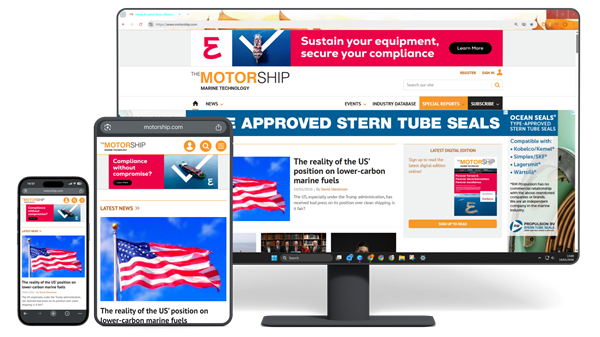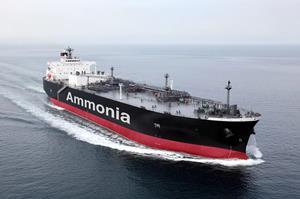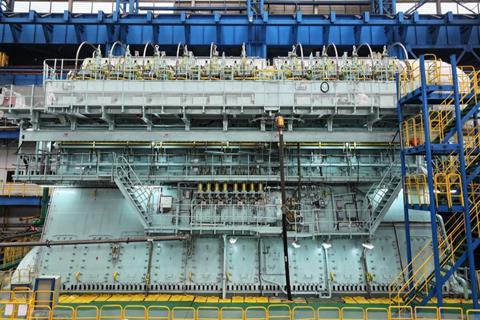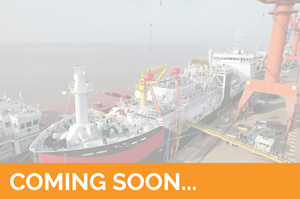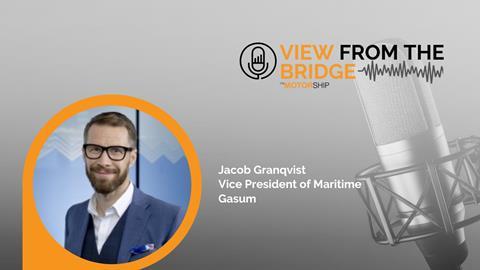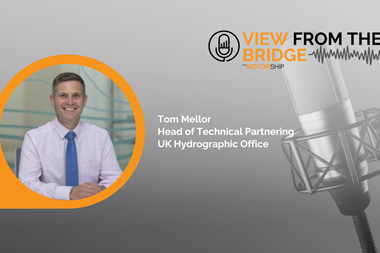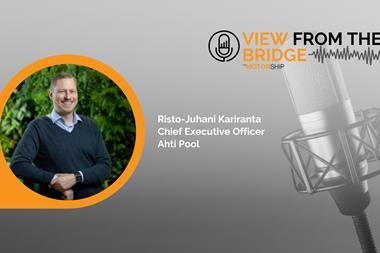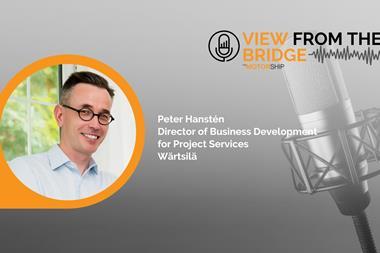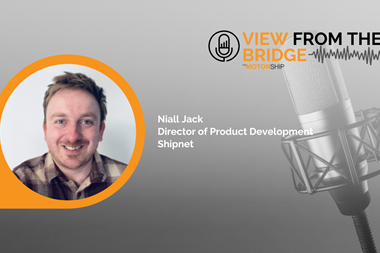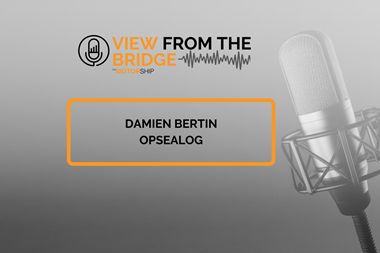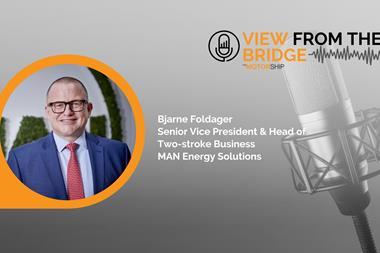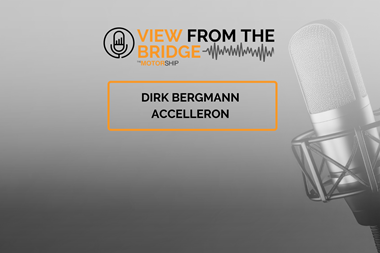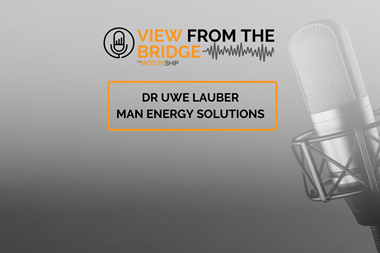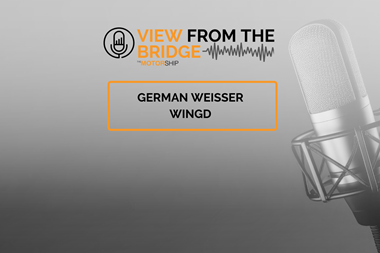Here is the full transcript of the interview. Please note this interview took place on the last day of the recent IMO meeting over NZF and the decision wasn’t known at the time
The Motorship
Hello I am here with Jacob Granqvist, vice president of maritime at Gatsum. Hello, Jacob. How are you?
Jacob Granqvist, VP marine, Gasum
I’m fine. Thank you so much, David, and really appreciate being here with you today.
MS
That’s no problem at all, Jacob. If we could start, you’ve been in the news quite recently, signing big clients to your pooling service. What puts Gassum in a unique position compared other pooling providers?
JG
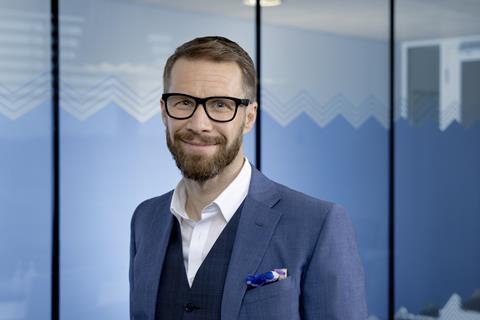
I will try to be short, even though there’s a lot of things to tell around just these topics and I’m happy that you asked this question because we are seeing now a lot of different pooling services and startups emerging in the market and if you look at Gassum and comparing us.
With all of these other companies, what makes us a little bit different? I wouldn’t say maybe I’m a little under exaggerating this now. So. So what makes the big difference is that that Gassum has the full value chain, which means in practise that we are controlling like everything.
MS
Okay
JG
From bio gas production to actual physical deliveries to long term customer loss of bio gas they generate then the over compliance which we then are.
Selling onwards to those who are in deficit. But as we own not only production, we have a vast bio portfolio, we are also making sure that it’s physically delivered to these customers and we own that customer relationship and in a partnership with these customers.
MS
OK.
JG
We have set it up so this means that the difference from another maybe just a platform, maybe it’s just one who is brokering this is that we can give more security to the off takers in the business. Like we will actually guarantee that they get.
Get the compliance units that we say that they will get.
MS
Sure. And obviously FuelEU Maritime came in into force this year. Presumably Gasum was doing other things before that, I’ve seen in the news you’re getting clients every other week.
Are you seeing clients attracted because of the production of bio-LNG and regulation?
JG
I would say that that due to this unique offering that we have that it is all about trust now because you are trading basically something that doesn’t exist yet because it will only exist.
After the reporting period itself, during the verification period of Julia, which happens next spring, and then only will the units be verified and claimed. So right now we’re selling something that doesn’t really exist and then?
It’s all about trust then. So how much fail face value do gossam have in the market like our, our customers trusting us to provide them what we have agreed on and if not, what are the kind of the, I would say the fall back and will we take care of them regardless?
MS
Is that like why the structure of the company might be quite important the fact that you are maybe state-owned that because people might won’t be worried about you guys falling over for some debts and things like that?
JG
So that is the question.
Yeah.
That, that’s again a very good point. The state ownership. I haven’t seen that as a benefit earlier when doing normal LNG deliveries and business and so on. And it might have even be be something that has made us a little bit slower to react to certain things and so on, but.
But right now it’s only seen as a benefit because what we are seeing now is that if something will go south and for some reason we couldn’t provide the compliance units that we have agreed to deliver to the to the customers.
MS
Sure.
JG
Then we will be and we’ll take full responsibility of the cost that is incurred then to to the customers and maybe some other companies are offering the same thing. But then again if you have a huge liability, maybe everything just goes sour and you have like 50 million liability at stake then.
MS
Of course,
JG
At least we have something to back it up with. If you have a start up, maybe they. Yeah, they could write it in a contract, but in reality, would you really get that money? So. So that is the big question. And I think that things like this now does have a difference. It makes a difference to the customer.
MS
And it’s like you said before that it was based on trust and that this backing that you have was that’s going to influence trust, perhaps isn’t it because they think, well, if you’ve got Finland state backing, you’re going to have, they’re going to perhaps trust you more.
JG
Of course. Yeah. Absolutely. It’s a value proposition for sure.
MS
Sure. And obviously the way the pooling works is the physical production of bio-LNG given that MEPC is meeting this week in London, are there any possible things that could happen that could change your model at all coming out? Are there any fears coming?.
JG
OK.
Yeah.
No, it’s a delicate question and right now as we are speaking we don’t know, when this is broadcast that it probably is a known fact that how did the voting go and what was the turn out of the IMO.
MS
Yes.
JG
Or meeting, but for sure if IMO decides to go ahead with the proposal that’s on the table for sure it will have an impact and even a greater impact probably than people think because then we are going let’s say that IMO goes ahead in.
MS
Yeah.
JG
2030 then, like if we only stay with fuel EU, it will be needing some 10 terawatt hours of bio or renewable fuels to make all the vessels in EU compliant. If we go for IMO we would need 10 times the amount like 300.
Terawatt hour of energy, so a renewable energy that is so it will make a huge difference. However, nothing will change in the short term for the ship owners because FuelEU is still there.
MS
Okay
JG
And so to think that fuel EU will disappear overnight if IMO, goes ahead. That might be an illusion. So we do think that that there’s there is fuel EU and and compliance related to that that needs to move and there will be.
JG
A business going forward as well. However, let’s see how that then might transition into IMO system with the IMO system as it is proposed, reminds quite a lot of the fuel EU system. So for sure we will adopt to that and we aim to be in that market as well.
MS
OK.
JG
And as I said. In IMO, it will also be about trust and somebody needs to generate those units and to generate those units and compliance you need to have renewable fuels and that’s the space we’re in. So we are not holding back. We are investing still in bio gas production. We are investing in increasing of overall bio.
MS
Sure.
JG
Portfolio and of course settling ourself in the market and being like a household name in the pooling and reduction market, that’s what we aim to do.
MS
Hmm. Sure. One thing I was going to ask obviously LNG and bio-LNG and the derivatives from it, I’ve spoken to engine manufacturers who seems to be making great strides with methane slip reduction. I’m just wondering as a company as gas and do you keep track of these sort of things?
Developments when the likes of Wartsilia or WinGD bring out a new thing, does the methane slip come into the equation for Gasum is it is it part of the regulations?
JG
Of course it is, and we’re in the heart of these discussions. I mean it for the customers and for the ship owners, the operators, the DLC holders, the methane slip does make a difference. Are you compliant just as such burning LNG or do you need some renewables?
MS
Yes, of course
JG
Fuels in order to be and then of course in the pooling context, like how much compliance can you maximum generate like what is the amount that can be generated with how much biofuel. And on the other hand I think that the even though we are monitoring really closely.
I’m most sure that there will be technical solutions and it is already now to me a non discussion. Things are getting sorted. The engine manufacturers are working hard to resolve the issues and we can relate as we also have.
JG
We have a traffic business. We do heavy duty vehicles and fuel them with bio gas and LNG and land vehicles, yes. And there was the same discussion when the first LNG trucks came like how about me taking slip.
MS
Land vehicles are we talking about it?
JG
And there was a an issue, but today there’s none.
MS
Right. OK.
JG
We have achieved great success in mitigating meat and slip and I would be surprised if you couldn’t do that on bigger engines like on vessels and so on. And we know that they’re already engines out there that have no meat and slip. So it’s a matter of time it will be sorted and I think that in lack of other arguments against the the meeting path, this is the one thing that people like to grab onto and kind of put forward as this is a non working solution due to meat and slip and what not.
MS
Yes I understand.
JG
But I say that that that discussion is becoming more and more, I would say non relevant.
MS
Fair enough. I mean, I noticed your company as apart from pooling offers things I’m not sure if this is carbon. What’s it called? in-setting or offsetting?
Or mass balancing green shipping on demand and you also have an EU ETS division where you can help people trade carbon credits. Do you mind telling us a little bit about those two, which I’ll probably not explain particularly?
JG
Yes. The green shipping on demand has been a kind of one of my babies and I started talking about this already many years ago even before I joined Gasum.
MS
Good.
Right. Okay, that’s your baby.
JG
And I approach ship owners, you know, and I said that, well, we could decarbonise you and you can just push the cost to your customers and by that you will be non exposed and we could deliver the exact amount of each container needed in order to decarbonise and. And so it will be step by step, customer by customer transition.
And you will not be like exposed to any risk like investing heavily in renewable fuel.
MS
So the customer has a choice whether to pay more for renewable or sustainable fuels?
JG
Yes. And back then, you know, the answer was, oh, you silly man, who would ever pay more for a green product, you know? And I continued this preaching, you know. And now, like, two years ago.
MS
Right, right.
JG
So we can like pick up that ball. And they said, well, it might not be so stupid after all. And together we approach them their customers and now it is working and more we see more and more traction, more and more customers like.
Producers of consumer goods like heavy industry they are picking up on this now. And to them like now, when you’re reporting Scope 3 emissions and all of this, there is a market for this so.
MS
Ah, there’s a market for it?
JG
It’s picking up, it maybe hasn’t been as fast as I would have hoped to seven years ago, but for sure it’s gaining traction and now we see a lot of the big liner companies that they have similar products and it’s something that I have said that I’m happy if everybody just.
JG
Copy and just do this thing because that will make things better and it will create a demand for renewable fuels and also it will make it’s a cliche, but it will make maybe the world a little bit better.
MS
Yes, It will fund them as well. Surely, if consumers are paying for the consumable, it’s it’s going to fund them. OK, fantastic. So you don’t mind if other companies copy this? This idea, which if so that’s very noble.
JG
No, no, I think that’s driving the industry forward and so on. And I guess the biggest recognition is when people copy what you do, you know.
MS
Yeah, imitation is the best form of flattery I think that’s something. So the EUETS you’re helping clients vanius with the secondary market with the carbon credits
JG
,hat’s what the way to say it in English, yes.
MS
Credits. Can you tell me how you guys are involved in that and what benefits you’re bringing?
JG
Yes.
If we talk about the EU as under EU, the ETS scheme and so on it, it’s something that we have been involved in since 2008. I think when the first regulation came on ETS for the industry.
MS
Sure of course
JG
So then we started doing this and we have quite a good record. Of course, if you look at track record, it doesn’t tell about the future, but we’re quite confident that we can provide the customers with a good ETS service and it hasn’t.
MS
Thank you.
JG
Being I would say it’s not a blockbuster in shipping yet, but now we had like for the first time now by end of September shipping companies had to surrender EUA. And we did see, I wouldn’t maybe call it the mayhem, but we did.
MS
I see.
JG
See some chaos in the market the last weeks of September and we do believe that there is a value prop in this space.
MS
Yeah. OK, that’s it.
JG
Might become very interesting going forward for shipping customers and now also of course next year it will be 100%, it start off with 70 and so on. So next year it needs to be 100% or it didn’t start off with it was 70 this year, but then next year it will be 100.
And so there’s more at stake and we do see more and more interesting interest from the shipping community in this service. So let’s see where it takes us, but it’s something that we have capabilities of doing and and we’re also not only like.
Buying for on the customer’s behalf. We are also doing a portfolio management of EU as so that means that the the portfolio management, it’s more like we are managing as it says we are managing a portfolio and by doing so.
MS
This is it on the secondary market?
JG
We have a very good track record of beating the market. If you would buy like just regular.
MS
Yeah. So you’re looking at the spot prices of these EUAs all the time and thinking that’s gonna fluctuate.
JG
Yes, we have a 24/7 desk that sits and monitors these things. Like all the time. So they are very on top of the market.
MS
Fantastic. OK, so this is what I usually call sort of crystal ball time. So if we look maybe 10 to 15 years in the future regulation or what I call the regulatory tsunami has started in shipping and it’s coming and it’s I mean.
If you look going out, it’s going to get much more punitive. How are you? How is gassing sets up to deal with that? Is that a boon for you guys? If you’re bio-LNG production?
JG
Absolutely.
MS
How do you see the next 10-15 years of if I can ask you that quickly.
JG
It it’s a question of keeping up. Can we keep it up? You know, the pace of of investing more in bio gas production and and having those fuels available for the customers and I and for sure we see that there’s opportunities in this and there has been a lot of hard Times Now we have invested heavily in in bio gas production and the infrastructure.
That we have and hopefully we can get something back now when when regulation is increasing but then also demand voluntary demand is increasing, but for sure it’s a you can call it the tsunami right now it’s just a warm up you know.
MS
it’s just a ripple rather than a tsunami at the moment.
JG
Now it’s a warm up. I mean 2% in the FuelEU. You know, that’s that can be handled 6% will be kind of a then you need to roll up them sleeves and get dirty. You know you need to do something in.
In 2035, it’s 14 1/2 percent. You really need to sweat a little bit to make it happen. And I think what the customers need to start, let’s talk about ship owners, operators and the ones who are who are need to be compliant.
That they really need to start planning for the future and by saying planning for the future. It’s not only like investing in assets like dual fuel vessels and whatever you have like technology that can bring the the emissions down, that is a big part of it.
In order to enable things going forward, but what you also need to appreciate that the way of buying these fuels is something completely different than buying heavy fuel oil because buying bunkers today in shipping is like it goes by USD.
MS
Yes I understand.
JG
And mass. So that’s the two parameters that you have. How much do I get for the buck basically per tonne but but going forward you need to to incorporate things like first of all, what is the CII score like the carbon intensity of the fuel. Then you need to think about the energy that you get from the fuel.
MS
yeah sure.
JG
And and then of course price. But the big thing going forward be will be availability.
MS
Of course
JG
And thinking that you would get renewable fuels at the cheap price with a low carbon intensity on a spot market that is just the illusion, you know it.
It might be a nice dream, but we already now see that the ones who are committing to longer term programmes of of connecting production to their company, and we have these setups going on and those will be the winners at the end of the day. Maybe you pay a higher.
Higher price for it right now, but it won’t be a matter of price going forward. It will be a matter of availability. Can you even get it? And then of course, if you can like lock in volumes now at the cheaper price compared to the penalty.
MS
Mm-hmm.
JG
Then you’re a winner, because if there, if there isn’t enough for everybody, then some will have to pay the penalty.
MS
And Gasum provides this because obviously it’s biofuels using the general term is what you guys do. I was at the London Essential Shipping Week and they say, it’s a great bridging fuel, but you’re producing it in quite good quantities and ship owners need it.
JG
Yes.
MS
Ammonia and methanol, which is going to be, as you say, quite hard to get in, in decent volumes, you’re kind of providing the answers now, not to put words in your mouth, Jacob, but that’s the kind of sense I’m getting.
JG
Yeah, it is. But then we need to also understand that the real impact like starting from LNG, you’re already reducing 20% compared to conventional fuel. Then you get the biofuel to give even further reduction.
MS
I see
JG
And then when you do come to the E fuels. It’s no more difficult to make synthetic LNG or synthetic methane compared to making green methanol. So you are on par like financially.
MS
OK.
JG
But what distinguishes the methane path from the methanol path is that we already have the infrastructure, so we don’t need to build new things. And to be honest, David, like, do you think that somebody would have built this vast network
MS
Yeah. that’s a big thing I think
JG
Like LNG network and the gas infrastructure in Europe for the shipping companies?
MS
No.
JG
I mean, that wouldn’t happen. So you need to have the underlying industry, I mean more than half of Europe is probably heated by gas. So you have the infrastructure, they have the volumes coming into this LNG terminals in Europe.
MS
Thank you.
JG
Where you can then offload and you have the infrastructure. Then for the bunkering business and that would need to be made out of scratch, more or less for methanol or ammonia.
MS
Yes, I see.
JG
And it took us like 20 years to get where we are today with LNG bunkering. And then we had the backing of the industry and all of that. So you can imagine only setting that up for for methanol and ammonia and whatnot, it won’t happen in five years.
MS
Yeah.
JG
You know that? I don’t think so. At not least that scale and then you have all the other like things going going on as well. But I also think that’s important when you talk about renewable fuels that you compare apples to apples so.
MS
Agreed
JG
For example, if you go into E fuels, then the methane path. As I said, it’s financially as on par with green methanol. Yeah, you have the infrastructure problem, but then what one producer of?
On methanol production facilities told me like they produce equipment for these facilities and he told me like why on Earth would you settle with methanol for the shipping industry, where everybody’s nagging about the cent here and a cent there on the tonne.
Where you could do just a little bit more refining and you would get plastics.
No. So you could turn methanol into polymers and then you have a completely different customer base.
MS
Right, right.
Oh, I see now.
JG
You know, I I don’t know if you have played with these small little plastic bricks, you know, let let. Yeah, yeah. Lego. I I thought that we couldn’t name drop here like promote products and so on. But let’s talk as things are like Lego. So if you go out and buy Lego for yourself
MS
Lego, you mean?
No, I I don’t.
JG
The kids of your friend or for your own kids. You know, if it costs a euro more or a dollar more, the books and it’s carbon neutral, you know you don’t care. You know, it’s like, OK, that’s the price and oh, great, it’s sustainable. It’s a nice product. And I give it to my kids. And you can happily say that I bought.
MS
Yes, as it’s sustainable
JG
Sustainable toys, you know, so there’s a completely different.
MS
Yes.
JG
Cost absorption mechanism in that market then you have on bunkers which is like white tradition. It’s been like the the cheapest, dirtiest thing that you could ever get out of a refinery.
MS
I mean that’s fuel that I spoke to someone who was actually, he was a member of a let’s call an LNG lobbying group for shipping. That’s really going to give it away. And he said he’s from the energy industry and ships used to run on the dirtiest fuels there were. Now regulation has hit hard of course.
JG
Yeah.
OK, exactly.
MS
This has been fantastic speaking to you, thank so much. I especially like the chat about Lego towards the end. That’s been fantastic. So just saying thank you very much for speaking to me and I will sign off there, OK.
JG
Yeah.
Thank you so much. There. It was a pleasure.

